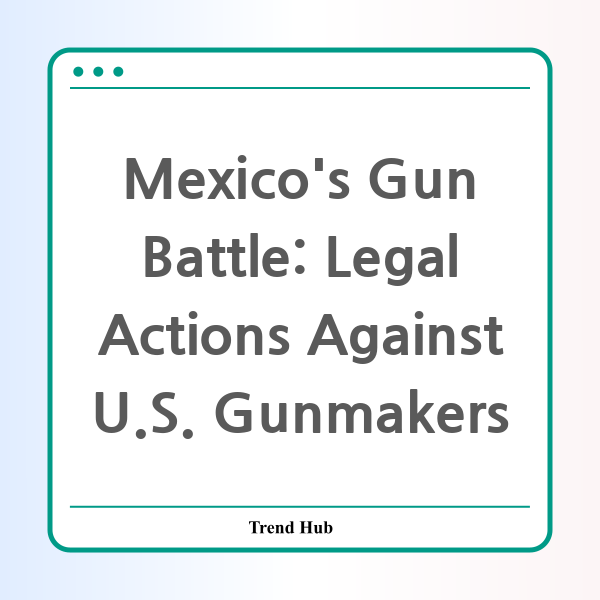* This website participates in the Amazon Affiliate Program and earns from qualifying purchases.

What happens when the line between terrorism and crime blurs? In Mexico, the stakes are rising as the government contemplates legal action against U.S. gun manufacturers if cartels are officially classified as terrorist organizations. This potential shift in classification could have profound implications for the ongoing violence and instability fueled by drug cartels in Mexico.
Mexican President Claudia Sheinbaum has recently made headlines by threatening to expand existing lawsuits against American gunmakers. Currently, it is estimated that 74% of the firearms used by criminal organizations in Mexico are sourced from the United States. These weapons, ranging from handguns to assault rifles, are smuggled across the border at an alarming rate, with estimates suggesting that between 200,000 to half a million guns make their way into Mexico each year.
At a press conference, Sheinbaum stated that if the U.S. government takes the critical step of declaring Mexican drug cartels as terrorist organizations, it would necessitate a reevaluation of legal strategies from the Mexican side. She indicated that complicity charges could be made against U.S. gun manufacturers, holding them responsible for the violence perpetuated by the cartels.
The cartels in question include notorious groups such as the Sinaloa Cartel and the Jalisco New Generation Cartel. These organizations have operated with near impunity, largely thanks to the arms smuggling that has allowed them to dominate the drug trade. Sheinbaum, in response to accusations of the Mexican government colluding with cartels, adamantly denied any such claims, pointing fingers instead at U.S. gun shops that sell high-powered weapons to these criminal groups.
This escalating situation has caught the attention of U.S. officials, as evidenced by recent moves to enhance military surveillance over Mexican territory. U.S. Air Force General Gregory Guillot confirmed that intelligence, surveillance, and reconnaissance (ISR) operations have increased in response to the growing threats posed by the cartels, which are closely intertwined with issues of illegal immigration and drug smuggling.
As the U.S. considers designating these cartels as foreign terrorist organizations, Mexico's government is forced to adapt its legal strategies and frameworks. Sheinbaum's administration has already filed lawsuits against various U.S. arms manufacturers, claiming damages amounting to $10 billion as a direct response to the violence in Mexico driven by these weapons.
It's a complex, multifaceted issue involving not just law enforcement and legal ramifications but international relations and national security. With the U.S. seemingly prepared to engage more militarily against the threat of cartels, the potential for increased tensions between the two neighboring countries looms large. Sheinbaum has expressed a desire for cooperation, emphasizing that any military flights occurring near Mexican airspace should be closely monitored, but the overarching concern remains: how to address the rampant violence fueled by illegal arms trafficking.
As dialogues around gun control and international crime intensified, it becomes more evident that the question of responsibility for the violence transcends borders. Will the U.S. hold its manufacturers accountable for the arms that find their way into the hands of criminals? And how will Mexico navigate the legal and diplomatic waters to protect its citizens from the onslaught of cartels? These questions remain at the forefront of Mexico's battle against organized crime, placing the nation at a critical crossroads.
* This website participates in the Amazon Affiliate Program and earns from qualifying purchases.